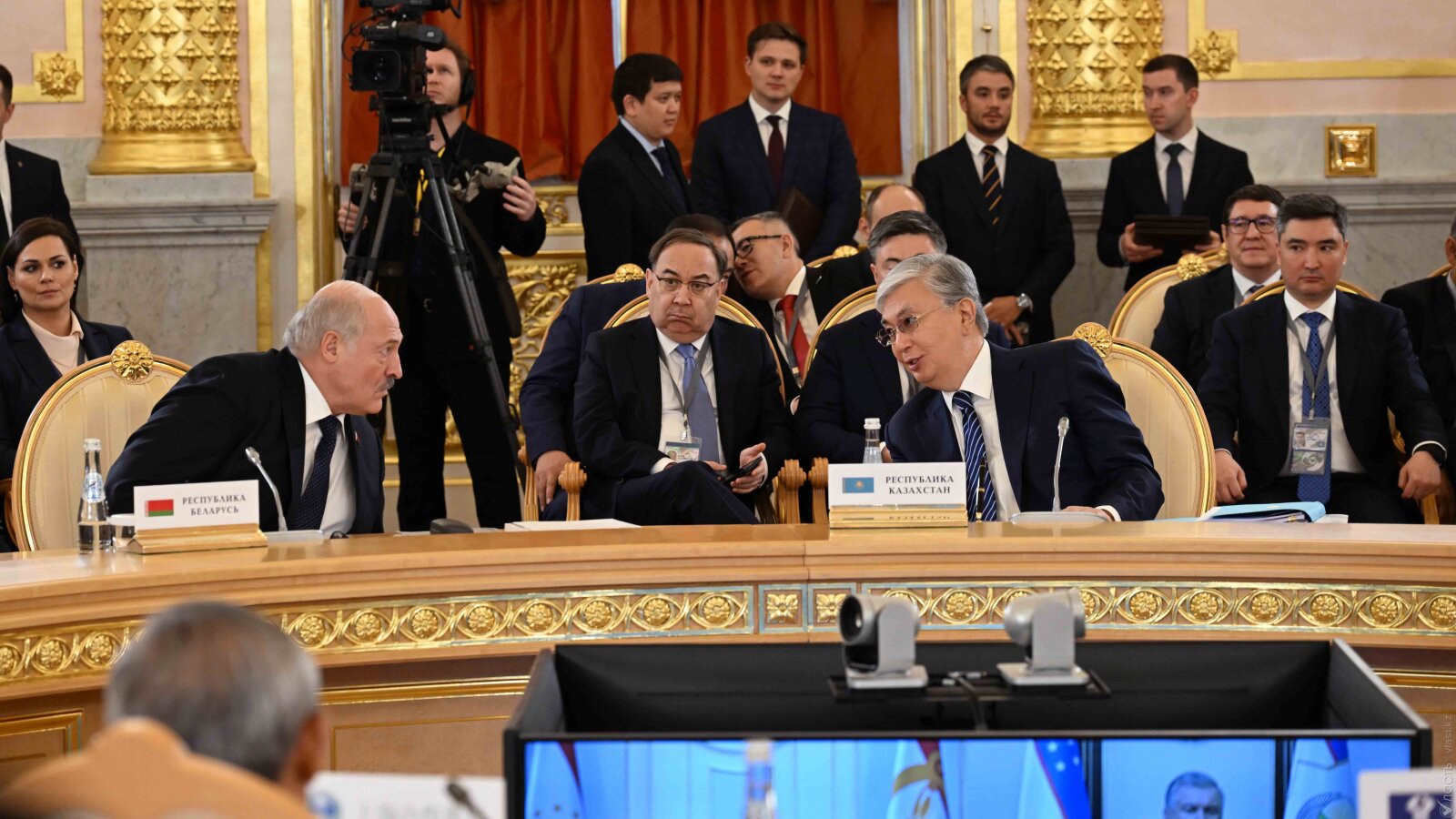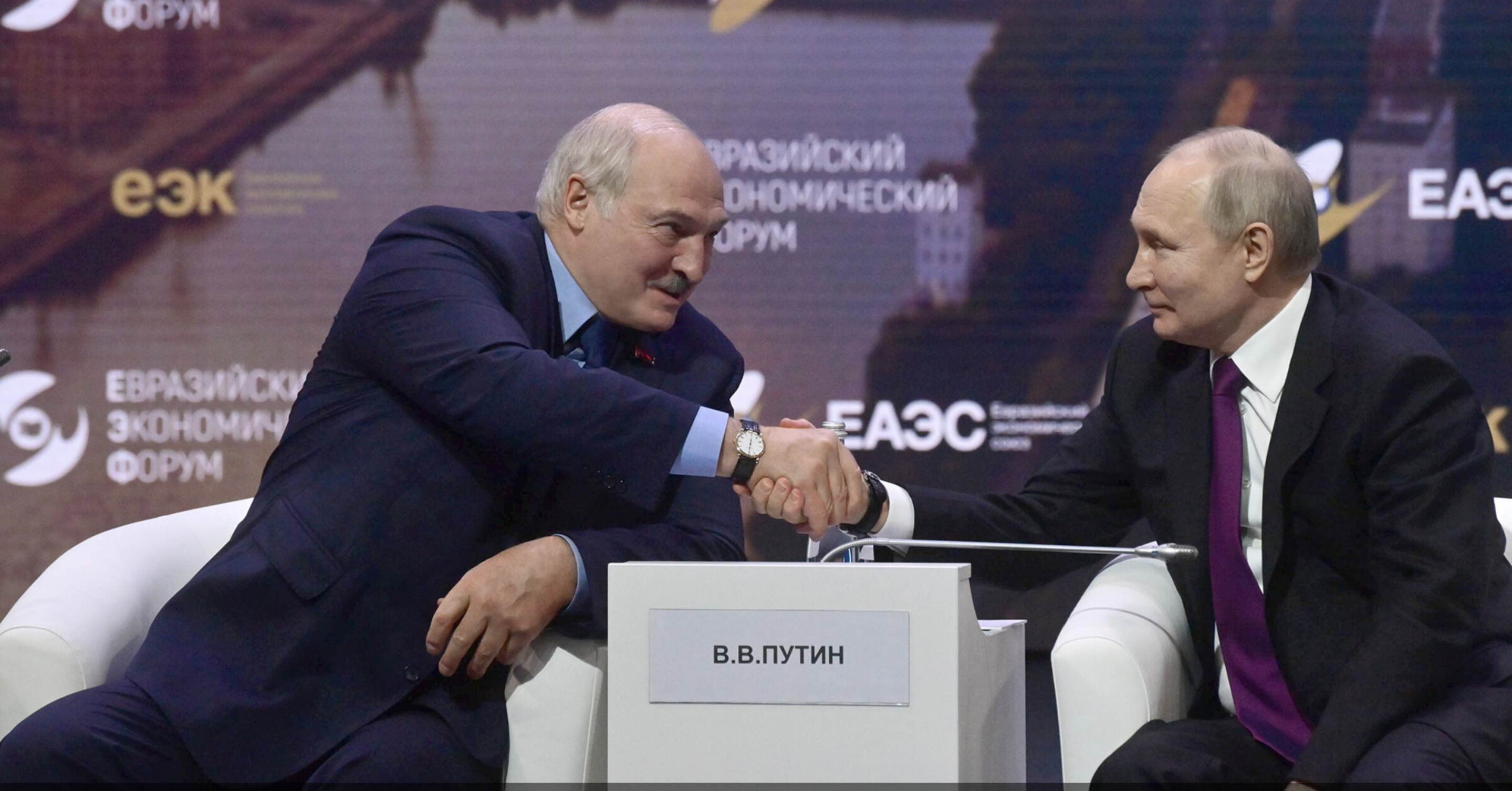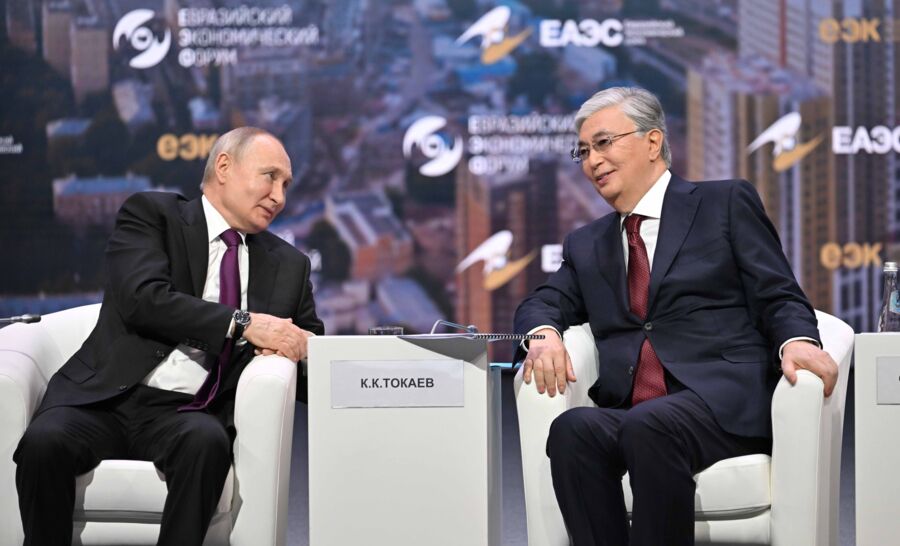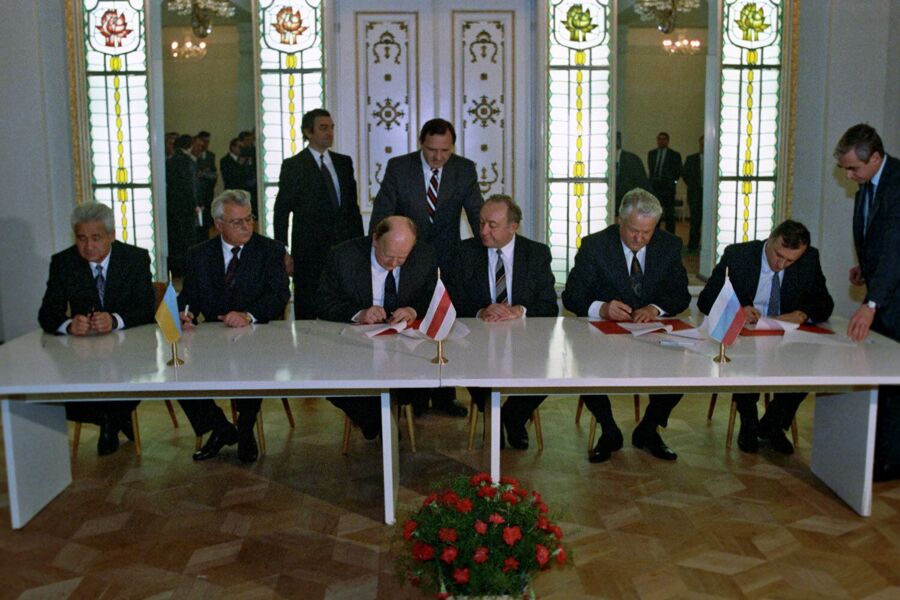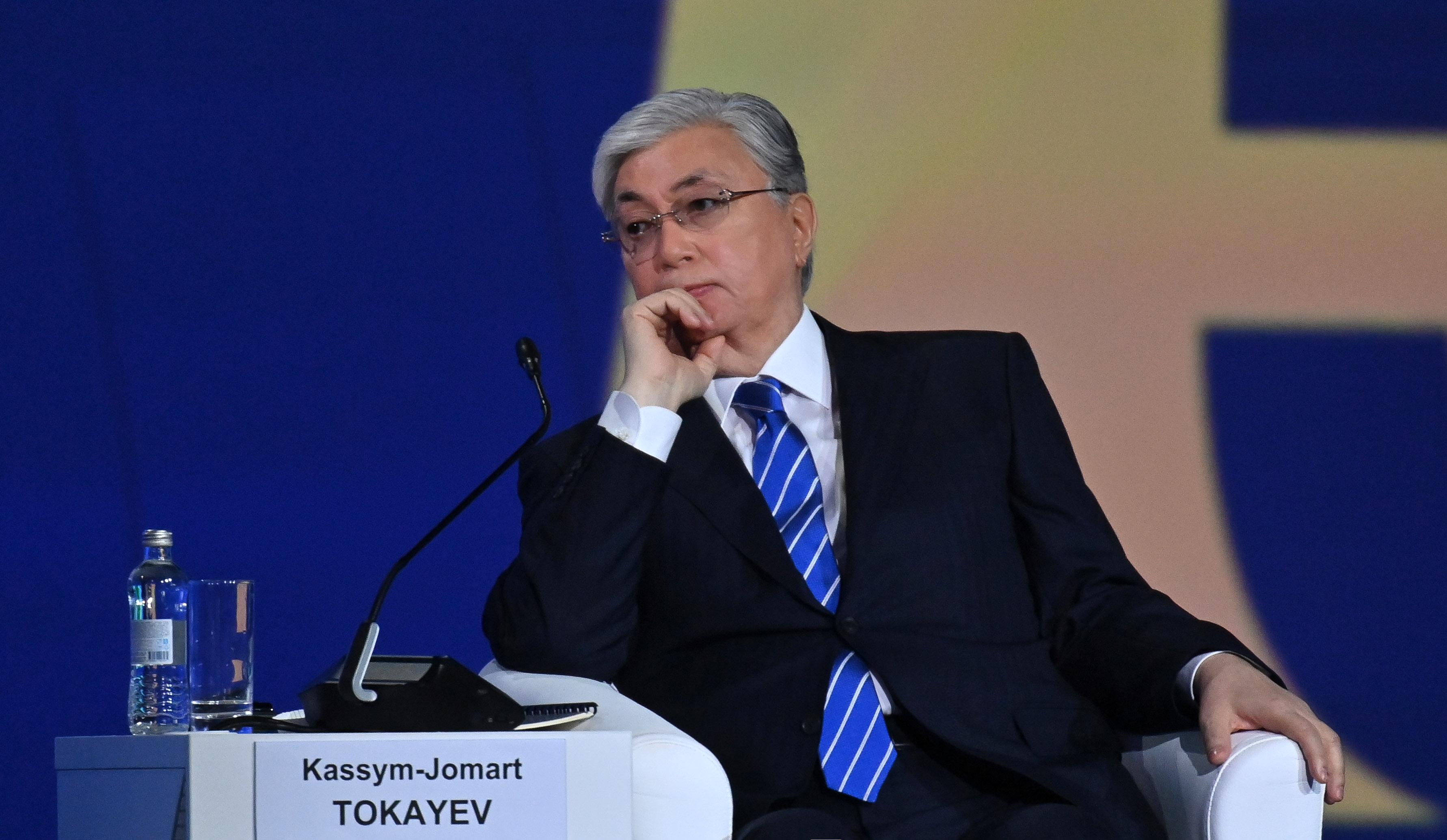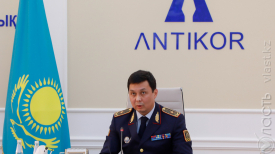- ВКонтакте
- РћРТвЂВВВВВВВВнокласснРСвЂВВВВВВВВРєРСвЂВВВВВВВВ
Kazakhstan’s President Kassym-Jomart Tokayev just had a long, full month. First, he visited Moscow for the Victory Day parade organized by Russia’s President Vladimir Putin, then he traveled to Xian to attend the first in-person China-Central Asia summit, and finally he went back to Moscow for a meeting of the Eurasian Economic Forum last week, where some of his words, though perhaps telling for the future of the region’s international relations, went somewhat unnoticed.
Tokayev spoke at a plenary panel among the leaders of Russia, Belarus, Kyrgyzstan and Armenia, the other members of the nine-year-old Eurasian Economic Union. While part of his speech hinged on the usual boilerplate diplomatic lingo, at one point his words made Belarus’ Alexander Lukashenko grin and Putin’s leg twitch.
“There is a specific point that we need to take into account. A ‘union state’, that is Belarus and Russia, exists within the framework of the Eurasian Economic Union. This represents a unique precedent in world history, a phenomenon that exists according to the principle ‘two countries, one state’,” Tokayev said, as reported by Kazinform.
He then stressed that the new entity displays its unity in several key areas, from diplomacy to the economy, from the military to the cultural sector. When he said “military”, before mentioning economic, currency, humanitarian or other sectors, Tokayev paused.
“I’m sorry, even nuclear armaments, they are now one-for-two,” Tokayev added, highlighting that the decision to move nuclear weapons into previously nuclear-free Belarus could become an issue.
It seemed that the war, which accelerated the institutional unification between Russia and Belarus, added yet another brick in the wall that separates their integration model from the more timid one between Armenia, Kazakhstan, and Kyrgyzstan.
The latter, according to Tokayev, represents “another level of integration”.
A Conceptual Issue
Filippo Costa Buranelli, associate professor of International Relations at the University of St. Andrews, focusing on Central Asian regionalism, said that Tokayev’s words are a sign of caution.
“It’s not the first time that Tokayev takes a contradictory approach towards Russia, in open disagreement with what Putin is doing. We should read this intervention as a sign of caution, first of all towards Russia, as it signals the willingness of Kazakhstan to engage within the EAEU insofar as integration doesn’t become political,” Costa Buranelli told Vlast.
And this is also a message that Kazakhstan is sending to the other two partners of the EAEU, Kyrgyzstan and Armenia, according to Costa Buranelli.
The three countries, in fact, seldom collaborate in the various areas that characterize the unity between Russia and Belarus. This two-level integration could cause imbalances, said Tokayev.
“We have to deal with this status quo. [We need to understand] how to work in these conditions. This is a conceptual issue. I think we need to discuss this problem at this economic forum,” Tokayev concluded.
For Costa Buranelli, Tokayev highlighted a fundamental issue in the unbalanced relations between Eurasian partners.
“Tokayev framed this as a conceptual problem. It’s a unique situation within an economic union and it concerns some of the fundamental principles of international relations: autonomy, independence, sovereignty, and politics,” said Costa Buranelli.
“Politics” Is the Problem
Much like his predecessor, Nursultan Nazarbayev, Tokayev seems to have a “problem” with any sort of “political” integration. Nazarbayev famously repeated that both within the country and across the region, progress needed to follow the principle of “economy first, politics later”.
“Tokayev is signaling that Kazakhstan is willing to engage within the EAEU insofar as the 2014 treaty is respected and insofar as integration doesn’t become political, let alone military, as demonstrated by his remark on sharing nuclear weapons,” Costa Buranelli said via phone.
Almaty-based political analyst Dimash Alzhanov is skeptical that Tokayev’s criticism towards the EAEU is genuine.
“Through the EAEU, the Kremlin projects not only economic but also political influence over Kazakhstan. It was obvious that this is not a full-fledged customs union where all member states are equal and despite speaking about the problems of the EAEU, Tokayev still shows a commitment to the integration process,” Alzhanov told Vlast.
Russia’s political influence could in turn create problems for the economies of other EAEU members, Alzhanov said.
“Russia continues to abuse its leading position and this poses increasing economic and political risks to others. The so-called ‘union state’ is in fact the absorption of one regime by another. And given the crisis of Putin’s regime, the ‘union state’ only increases the political instability and brings more contradictions within the EAEU,” Alzhanov concluded.
Military Danger
The use of Kazakhstan-based companies to circumvent Western sanctions against Russia was corroborated with a further example highlighted in an investigation by iStories, Der Spiegel, OCCRP, and Vlast. Reporters unveiled that several companies supplied Russia with drones and equipment that can be used for its war in Ukraine.
Now that Belarus has opened its territory for Russia to deploy its nuclear weapons, Tokayev seemed to signal his opposition to a potential inclusion of Kazakhstan in a renewed military alliance, a sort of an upgrade to the existing Collective Security Treaty Organization (CSTO), which is made up of EAEU countries, plus Tajikistan. According to Alzhanov, Tokayev is also wary of the possible consequences of sanction-busting channels for Kazakhstan-based companies.
“Against the backdrop of Putin’s increasing pressure and after the recent drone scandal, Tokayev’s statement seemed rather nervous. It seems as if he is looking to avoid becoming internationally isolated, like Lukashenko. He is, I believe, in a difficult position,” Alzhanov told Vlast.
“For example, the statement of the CSTO general secretary, [Kazakhstan’s former minister of defense, Imangali] Tasmagambetov, who openly called for using Kazakhstan's military-industrial complex to jointly produce weapons with Russia,” Alzhanov said.
Old (Post-Colonial) Frictions
In early December 1991, at a government residence in a forest near Brest, now Belarus, the then-leaders of the Soviet Republics of Russia, Belarus, and Ukraine met to sign the Belovezha Accords, which kick-started the existence of a Commonwealth of Independent States to replace the USSR. At the time, the leaders of Soviet Republics in the Caucasus and Central Asia protested their exclusion from the meeting, which effectively killed the Union of which they were part without their consent.
Costa Buranelli highlighted that, much like at the Belovezhskaya Pushcha dacha, most of the decisions within the EAEU are made along Slavic versus non-Slavic ethnic lines.
“I was struck by the similarities between Tokayev’s remarks at the Forum and the Belovezhskaya Pushcha, where there was this Slavic vs non-Slavic divide within Eurasia. Then, the Central Asian Republics protested because they were left out. [Uzbek SSR leader Islam] Karimov and [Kazakh SSR leader Nursultan] Nazarbayev were vocal about this. The fact that Tokayev juxtaposed Belarus and Russia against Kazakhstan, Kyrgyzstan, and Armenia reminded me of that,” said the scholar of Central Asian regionalism.
Tokayev, according to Costa Buranelli, could be rejecting the idea of “being taught what is right and what is wrong by his Slavic partners. After all, [Kremlin spokesperson] Dmitriy Peskov said that the Union State between Russia and Belarus is a benchmark of integration, or a model.”
Far from the End
When Kazakhstan’s sovereignty, territorial integrity, and history were questioned by Russian political personalities in the past few years, the leadership reacted with point-by-point rebuttals.
“Tokayev is not new to these call-outs. At the St. Petersburg Economic Forum, after the start of the war, Tokayev openly stated Kazakhstan’s determination not to recognize the separatist territories [which Russia occupied and later annexed - V.]. And it’s not the first time that he takes an approach that is in open disagreement with what Putin is doing,” Costa Buranelli said.
Experts agree that Tokayev’s words, while signaling an uneasy geopolitical positioning, are far from being an ultimatum.
“Tokayev still expressed positive comments about the EAEU. It is difficult to predict the future, but I don’t think we should read too much into Tokayev’s words with respect to a possible breakdown or a possible disjunction or a collapse of the EAEU,” Costa Buranelli said.
Alzhanov, who has repeatedly questioned Tokayev’s domestic and foreign policy, said Kazakhstan will continue to toe the Kremlin’s line with respect to Eurasian integration.
“Tokayev still shows a commitment to an integration process as devised by the Kremlin. His speech had no clear signal and no firm position defending Kazakhstan’s national interests,” Alzhanov said.
Поддержите журналистику, которой доверяют.
